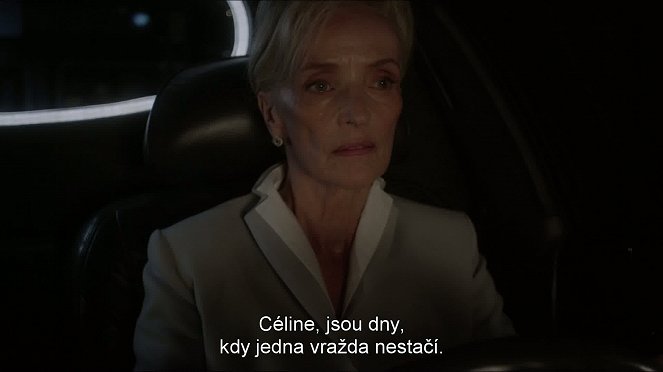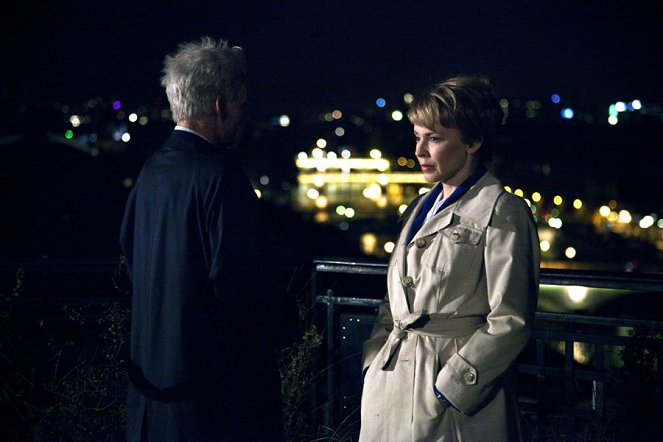Reżyseria:
Leos CaraxScenariusz:
Leos CaraxObsada:
Denis Lavant, Edith Scob, Kylie Minogue, Eva Mendes, Michel Piccoli, Jean-François Balmer, Annabelle Dexter-Jones, Elise Lhomeau, Leos Carax (więcej)Opisy(1)
Monsieur Oscar od świtu do zmierzchu wciela się w nieswoje role: jest przemysłowcem, zabójcą, żebrakiem, potworem, członkiem rodziny. Stacza erotyczną walkę w wirtualnym świecie gwiezdnych wojen, uprowadza Evę Mendes, romansuje na dachu wieżowca z Kylie Minogue i do ostatniej minuty nie pozwala nikomu wyznaczyć granicy, dzielącej fikcję od rzeczywistości. Monsieur Oscar krąży po Paryżu, wykonując „zlecenia”, pojawia się ciągle w nowych miejscach. Raz burzy bieg rzeczy, innym razem sprawia, że wydarzenia toczą się przewidywalnym torem. Towarzyszy mu Celine, kierująca jego limuzyną dyskretna blondynka, która pilnuje, by zadania zostały zrealizowane w określonym kontraktem czasie. (Nowe Horyzonty)
(więcej)Materiały wideo (3)
Recenzje (7)
“Weird … so weird.” The main prerequisite for understanding Holy Motors is to have a love for moving pictures and a willingness to let yourself be surprised and astonished. Carax’s film about films (and motion as such), actors (who can never completely abandon a role) and viewers (who, in the digital age with ubiquitous cameras, are also actors) begins when the still image was first set in motion (Étienne-Jules Marey). Subsequently, it offers a cross-section of film history and genres in an anti-narrative series of episodes linked together by Mr. Oscar (Carax’s birth name is Alexandre Oscar Dupont) as the personification of that motion (there is definitely a good reason that he is played by one of today's most talented actors) and a medium conveying meanings (his transformations are transformations of cinema as such). Social drama, anarchistic comedy (did Lavant’s imp also remind you of Chaplin?), gangster flick, musical, melodrama... The focus of Carax’s films has always been more on other films than on reality. Here he elevated this approach to the main principle of the narrative, resulting in a film composed of situations known from other films and thus deconstructing the film’s narrative. Unlike many of his colleagues who write love letters to cinema, however, Carax refuses to be sentimental or to consider that films and viewers are no longer what they used to be. His journey into the depths of one night in Paris (guided by a lady bearing the name of the famous French novelist, Céline) is subversive, cheeky and malevolent, as everyone must realise during the penultimate scene depicting the return to the “family” (and to the evolutionary origins, not of film, but of man – one cannot exist without the other). Beauty and weirdness are represented here in equal measure. Carax does not lament the end of film, but rather thinks about its possible rebirth. He understands film as a collective dream (in one of the first shots, we see a hall full of sleeping viewers). As a love affair (when the lovers in one of the last episodes talk about the fact that they have 30 minutes left, that also happens to the same amount of time remaining until the end of Holy Motors). Like life (we are all the sum of the films that we have seen). Life through films. Where there are no films, only death remains. P.S.: Holy Motors is also valuable educational material. In the imp segment, it shows the only appropriate reaction to a person who enjoys using “air quotes”. 90%
()
So was Monsieur Merde from Tokyo! was just Monsieur Oscar on vacation? What a disappointment. In any case, after seeing this, I can say just one thing: Kylie is tragic as an actress too. The rest is so weird and flamboyant that, despite everything, you should give it a chance even if you end up switching off in disgust after ten minutes. Even though there is a considerable chance that in this pastiche of incongruous segments you will find something to adore/detest; I found such elements here and proportionally they are represented exactly half-and-half.
()
I don’t like short, unelaborated FilmBooster reviews along the lines of “pseudo-intellectual bullshit”. But there is nothing else I can say about this abomination, which fits this particular description better than anything I’ve seen in years. Someone who knows how to operate a camera and who likes colors has written and filmed something that surely no one else would write or film. Is that supposed to be enough? One star only for the scenes with Eva Mendes, which were at least a little bit interesting. Probably because they had Eva Mendes in them.
()
Holy Motors gave me an extremely unpleasant experience that I will not forget for a long time. For the first half hour, I was just brutally bored, and in the following minutes, I forgot about the boredom under the impression of a growing hatred that I began to feel toward this construction. Intellectual masturbation of the worst kind, which rightfully puts all those refined aesthetes into ecstasy, who are willing to search for the most hidden meanings, even where there are none at all. I'm not saying that this is Carax's case, and of course, I can imagine several explanations for this plaything. However, I could not in any way approach the director's game, and one thing I know for sure - I will definitely avoid his name in the future. Popcorn enthusiasts probably won't have a reason to waste time with Holy Motors - and rightfully so, as it has nothing to offer them - it might appeal to those who admire the work of Peter Greenaway. As for myself, I can say that since Greenaway's 8½ Women, I haven't given any film the rating of Boo! with such perverse joy as Holy Motors. You can either love or hate this film - nothing in between. Those who give it 3 stars are deceiving either themselves or others. I could praise the perfect camera, the performance of Denis Lavant, or the fashionable face of Eva Mendes, but I'd rather do it some other time and for another film. Overall impression: 0%.
()
The animal Lavant should bite the penises and fingers off all those who call it "pseudo-intellectual". This is an absolutely cinephile pleasure, a wonderfully nostalgic, schizophrenic and energy-pressurized endeavor, to which any attempt at "intellectual and rational" interpretations takes the wind from the sails. Sure, Carax uses a myriad of references (to French cinema and especially to his own films), but Holy Motors does not need a complete understanding thereof to run smoothly - on the contrary. It's a wonderfully animalistic, subversive, fresh and physical spectacle, a film that is completely different from most of today's wanting and conventional titles. A demonstration of magical life in a time of ever-increasing emptiness, for me a film with a big F. For those who don’t understand it, go straight to the cemetery a lie down, OK?
()



Reklama